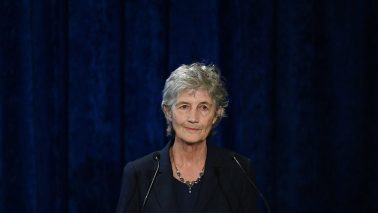Here is a selection of pieces from the weekend’s literary pages.
The Guardian profiles Neal Cassady, the inspiration for Dean Moriarty in Kerouac’s On the Road.
‘Carolyn Cassady opens the door to her pretty green cottage with a lipsticked grin and a shy handshake. She’s 87, but looks a decade younger, dressed neatly in a lavender fleece with matching moccasins. The second wife of Beat muse Neal Cassady – the man immortalised as Dean Moriarty in Jack Kerouac’s 1957 classic On the Road – Carolyn moved to London in 1983, and relocated here 10 years later. “I was brought up English,” she says. “My parents were anglophiles and we had a whole lot of English customs at home. I made the break and I much prefer it.” Her knick-knack-filled Berkshire home has now become a regular, if unlikely, stop on the Beat trail. Walter Salles, the Brazilian director behind the new movie version of On the Road, is her most recent high-profile visitor. “He came four, five times,” says Carolyn, with a twang that betrays her Tennessee childhood. “We’re good friends.”’
Tristram Hunt talks to Eric Hobsbawm about Marx’s resurgence.
‘The global crisis of capitalism, which has wreaked havoc on the world economy since 2007, has transformed the terms of debate. Suddenly, Marx’s critique of the instability of capitalism has enjoyed a resurgence. “He’s back,” screamed the Times in the autumn of 2008 as stock markets plunged, banks were summarily nationalised and President Sarkozy of France was photographed leafing through Das Kapital (the surging sales of which pushed it up the German bestseller lists). Even Pope Benedict XVI was moved to praise Marx’s “great analytical skill”. Marx, the great ogre of the 20th century, had been resuscitated across campuses, branch meetings and editorial offices. So there seemed no better moment for Eric to bring together his most celebrated essays on Marx into a single volume, together with new material on Marxism in light of the crash. For Hobsbawm, the continual duty to engage with Marx and his multiple legacies (including, in this book, some fine new chapters on the meaning of Gramsci) remains compelling.’
Writing in the Telegraph, Jay Parini explores Herman Melville’s and Nathaniel Hawthorne’s friendship.
‘Melville was working on Moby-Dick, his masterpiece, at this time, and Hawthorne pushed him to go beyond anything he had done before. As ever, Melville needed money, and desperately hoped that his rip-roaring story of the pursuit of a massive and dangerous white whale would attract readers. Hawthorne, the allegorist par excellence, saw that Melville had before him more than a sea story. Here was a metaphysical quest, with man pitted against nature. Without Hawthorne’s conversations through the winter and spring of 1851, Melville may not have realised fully what he had on the desk before him.’
Writing for Slate, Johann Hari reviews Jonathan Watts’ When a billion Chinese jump’.
‘When Jonathan Watts was a child, he was warned: “If everyone in China jumps at exactly the same time, it will shake the earth off its axis and kill us all.” Three decades later, he stood in the gray sickly smog of Beijing, wheezing and hacking uncontrollably after a short run, and thought: The Chinese jump has begun.’





Comments